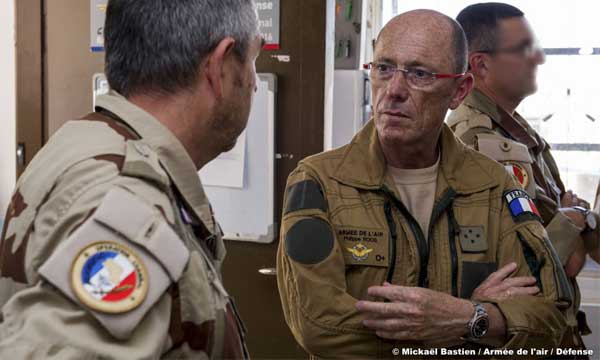"When it comes to military MRO, it's not all a question of money" |
| Interview by Helen Chachaty |
|
|
20 JUL 2017 | 895 words
|
 |
French Air Force General Philippe Roos during a visit in the Middle-East. © MickaŽl Bastien/French Air Force |
|
|
|
A year and a half after taking over at the top of the SIMMAD (the French Ministry of Defence's integrated aviation equipment maintenance in operational condition structure), General Philippe Roos draws up a first analysis of the actions taken to improve plane availability rate and presents Le Journal de l'Aviation with the areas to be developed in terms of military MRO.
What is SIMMAD's scope?
According to annual objectives, SIMMAD is responsible for providing French armed forces with the number of aircraft they need to meet their own objectives in terms of operational preparation and missions. The 1200 members of staff dedicated to this mission manage a fleet of some 1250 aircraft belonging to the three branches of the armed forces, the DGA Flight Tests, the National Gendarmerie, Civil Security and Customs.
We are responsible for the contracting process with private and state industrial companies for all industrial support maintenance operations and for programming and having these contracts carried out. We also have teams tasked with processing technical events and providing directives, in agreement with the usage authorities.
SIMMAD also manages the whole logistical activity, in particular with the acquisition of spares and technical batches which enable the airborne activity to be carried out, with a function to check that logistical management is being implemented successfully.
What did you identify as challenges when you took over at SIMMAD?
I felt that we had to manage "critical fleets" as a matter of priority, fleets that were under tension due to operations, such as the Atlantique 2, tactical transport planes and helicopters. There were also fleets which were considered as "less critical", but which have to be monitored closely due to their major involvement in operations, such as fighter aircraft. At any rate, we need to manage the consequences of increased activity and intensity better, such as the technical and logistical difficulties generated by operation under harsh conditions.
We therefore had to deal with the criticality of these different fleets, while successfully completing the SIMMAD conversion projects at the same time, with the objective of rationalising the processes and making them smoother, especially the supply chain processes, while managing personnel deflation.
In terms of equipment availability, what are the resources put in place by SIMMAD?
In terms of military MRO, it's not all a question of money. There's no culture shock or revolution or any definite action which would enable us to increase long-term availability in record time. The guiding principle is to put in the groundwork over time.
We are doing everything to improve the line. When it comes to helicopters, for example, we have worked to improve the recommended maintenance plans, with the introduction of level dialogue and Government-industry dialogue, to handle availability and unavailability problems, with closer dialogue and the establishment of regular objectives. The processes implemented and the measures taken mean that we can plan on obtaining overall availability at around 50% by 2021.
As another example, with the Rafale fleet the objective is to have an availability rate of 80% during operations. Choices have been made and it is up to us to calibrate them, especially in logistics terms, so that we can achieve these objectives without transferring unavailability back to mainland France. The process is related to operations, and if we avoid "sampling", so that we don't transfer unavailability to fleets in mainland France, here again we must have close dialogue with our industrial partners.
Now that you mention it, how do you manage relations with the industrial sector?
It's not enough to just put money on the table for parts to arrive more quickly. It takes an average of 18 months to produce spares, over 30 months to manufacture an M88 and sometimes up to 42 months for certain parts. Industrial capacity has to keep up with our needs. This means that the support contract needs to be well written, with a relationship of trust clearly established throughout the whole lifetime of the contract, which may be completed with amendments if necessary, quickly and according to circumstances.
How does SIMMAD integrate digital transformation into its action plan?
The military MRO environment produces a huge amount of data, terabytes which are stored and with which we don't do much for the moment, at least not enough. Once it's "cleaned" and "stored", data has real worth. We have put action plans in place to manage our digital transformation, to improve data quality, to use Big data for preventive or even predictive maintenance, to better manage the size of our stocks and to anticipate, better size and transmit our expectations to our industrial partners to meet our exact needs. Everything starts and ends with data, which needs to be fully managed ans secured - like the RFID projects which we are developing and deploying across the branches of the armed forces, to speed up inventory or logistics operations.
However, we need to make sure that we don't "drown" in the vast amount of data which is being generated. We need to establish a guideline and make sure that we are not saturated by solutions which will generate difficulties in processing this same data.
Last summer we also set up an agency responsible for data governance, whose ambition is to quickly provide quality data to everyone involved in military MRO.
|
|
| |
| |
They made this section possible |
|
|
|
|
|
|
|
|
|
|
|
|
|
|
|
|
Top stories |
|
|
|
|
|
Top stories
|